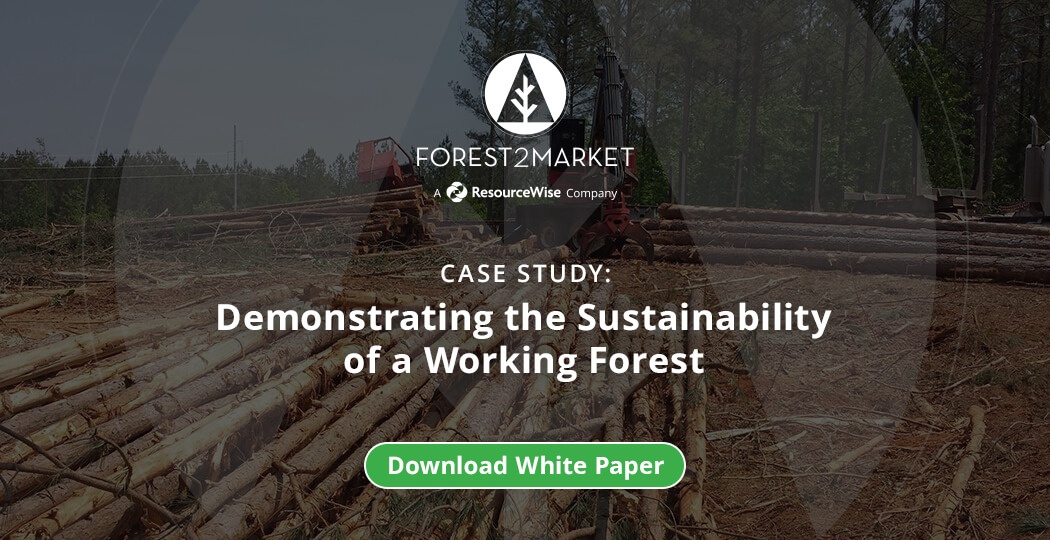4 min read
Forest Products Sustainability Projects Making Headlines in September
Forest2Market
:
September 22, 2022

The push for decarbonization and a transition towards a circular global economy continues to drive innovations in nearly every business sector across the globe, and the forest industry is helping to lead the way. We wanted to share a few of the most exciting developments in this roundup of recent sustainability-oriented projects that are making headlines.
Alder Fuels and Enviva Partner to Further Commercialize Large-Scale Woody Biomass
Enviva, a leading producer of sustainably sourced woody biomass, and Alder Fuels, a clean tech developer and greencrude producer, have signed a contract for the long-term, large-scale supply of woody biomass from Enviva, which sources low-value fiber, such as forest byproducts like tree tops, limbs, and commercial thinnings, to further commercialize the supply of sustainable aviation fuel (SAF).
The agreement would make Enviva an exclusive supplier of up to 750,000 metric tons per year of sustainably sourced woody biomass to Alder’s first Alder Greencrude (AGC) production facility, soon to be under construction in the southeastern United States. The supply of sustainably sourced woody biomass feedstock by Enviva is expected to commence in 2024, which will meet rigorous sustainability criteria, subject to independent, third-party audits and certifications, the company said.
SmartLam and Peak Renewables Announce Symbiotic $92 Million Relationship
Economic development projects involving an engineered wood products company and a Canadian wood pellet manufacturer will lead to a combined $92 million investment and 70 new jobs in Houston County, Alabama. SmartLam North America’s Dothan Division plans to construct a new production facility in order to manufacture large glulam beams and columns. The facility is expected to run $62 million.
In addition, Canadian-based Peak Renewables will construct a new wood pellet production facility on 30 acres behind the SmartLam facility, utilizing sawmill residuals to produce the wood pellets it markets for renewable power generation.
The new facility, expected to be fully operational in October 2024, will have the capacity to produce 84 million board feet annually when it reaches full production. Using residual wood fiber from Rex Lumber sawmills, Peak will ultimately be able to produce 180,000 metric tons of wood pellets each year at the facility. Construction on the wood pellet facility will be completed by mid-2023.
DS Smith Looking at Alternative Raw Materials for Paper-Making
DS Smith has reported that it is trialing new and innovative materials for its paper and packaging making process which includes straw, daisies, hemp, cocoa shells and seaweed. The DS Smith Innovation Team is looking at these materials with a good environmental profile as many of them require significantly less energy and water to produce than some traditional paper-making materials.
The company is currently trialing a range of alternative fibers as part of its £100m R&D and Innovation plan to accelerate its work in the circular economy. The program will look at the fiber potential and plastic replacement capabilities of a number of materials in order to diversify the range of sources it uses for packaging.
New Carson City Sawmill to Process Timber Salvaged from Wildfires, Forest Thinning Projects
A new sawmill in Carson City, Nevada that can produce about 50 million board feet of lumber per year is set to begin operations in early 2023. It is the first major mill to open in the area in decades; the next-closest mill is in Quincy, Calif.
“We will be the natural buyer for anything within 50 miles of our mill,” according to Kevin Leary, chairman of Tahoe Forest Products. TFP has a 15-year lease for the site, renewable for an additional 10 years, with the Washoe Development Corporation, the business arm of the Washoe Tribe of Nevada and California.
Once operational, the $10 million project will employ about 40 people. The 40-acre site will be divided into about 30 acres for logs waiting to be processed and about 10 acres for processing facilities, including a sawmill building and rough lumber sorter, dry kilns and a planer mill and sorter to finish lumber.
The mill will process both salvage and green lumber, according to Leary, with an emphasis on processing timber burned in recent wildfires such as the 2021 Caldor Fire near South Lake Tahoe. The fire was one of many that burned through California last year – nearly 2.6 million acres were charred, with 1.5 million of those just in the Sierra Nevada.
UPM Gears Up for Bio-MEG Commercialization
UPM Biochemicals is gearing up for its incoming wood-based glycols production in Leuna, Germany, which is expected to be operational by the end of 2023 and ramping up to its full 220 ktpa biorefinery capacity by 2024. The main products that will be produced from the biorefinery are Bio-MEG (monoethylene glycol), bio-MPG (monopropylene glycol), renewable functional fillers (RFF) derived from lignin, and industrial sugar.
UPM announced a development partnership with South Korea-based Dongsung Chemical this month using UPM’s bio-MEG BioPura™ to manufacture renewable polyurethane. The companies will target the Asian market and its vast textile and footwear indusBioPuratries. Dongsung Chemical plans to diversify its portfolio by advancing its eco-friendly product lines by integrating UPM’s bio-MEG into its production. The company intends to expand the field of application to automotive interior materials and adhesives.
CanCollar® X Is Newest Solution Automated by Patented CanCollar Fortuna® Platform
WestRock Company (NYSE: WRK), a leading provider of sustainable paper and packaging solutions today announced an expansion of its CanCollar® family of multipack solutions with the introduction of CanCollar® X, a fiber-based solution for sustainable large format canned beverage packaging enabling as much as fifty percent material reduction compared to fully-enclosed traditional packaging.
As the newest addition to the family of solutions automated by the patented CanCollar Fortuna ® platform, CanCollar ® X uses a similar fiber-based, glue-free minimalist design preferred by consumers to maximize can visibility, is comfortable for consumers to handle and optimizes the use of material to bundle multipacks for larger formats.
“Whether it’s beer, soft drinks, or sparkling water, across the globe large multipacks of cans are packaged in shrink film,” said Chris Davidson, vice president, Sustainability at WestRock. “With CanCollar ® X we have an opportunity to significantly reduce materials when compared to fully-enclosed cartons and replace hard-to-recycle plastic shrink wrap with recyclable fiber-based packaging, improving circularity at impressive scale.”
Oregon Mass Timber Coalition to Receive Over $41 Million
Oregon’s U.S. Senators Jeff Merkley and Ron Wyden recently announced that the Oregon Mass Timber Coalition will receive over $41 million from the federal Economic Development Administration (EDA) as one of 21 American Rescue Plan Build Back Better Regional Challenge (BBBRC) winners.
Oregon Mass Timber Coalition, led by the Port of Portland, will use the funding to implement projects across the state to expand the regional mass timber industry cluster, which creates engineered high-value building materials from wood. Mass timber has the potential to substantially reduce carbon pollution compared to concrete and steel and is seismically resilient and fire resistant.
The coalition is planning projects to research, prototype, and commercialize prefabricated mass timber housing systems. The proposed projects are primarily focused on creating a manufacturing facility, workforce education and training, and building facilities that support research and development. Together, these efforts will create good jobs and economic growth while addressing the shortage of affordable housing.





